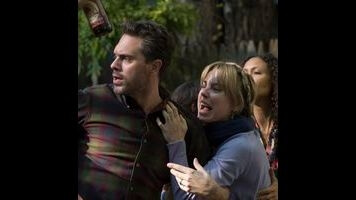The Slap searches for a sense of control in a chaotic world (and on NBC)

The Slap is a ridiculous title for an even more ridiculous-sounding premise. However, the original Australian miniseries (itself based on the Christos Tsiolkas novel) is one of the more affecting pieces of character-driven TV from the last five years. The story’s general premise undersells the show’s uniqueness and depth. The Slap is not exclusively about a kid getting slapped by a practical stranger; that event is simply a microcosm of these friends, family, and acquaintances.
Like its source material, each chapter of NBC’s The Slap is named after and puts emphasis on a different character. The premiere focuses on the impending 40th birthday of Hector (Peter Sarsgaard), chief of staff for the mayor of New York City and a walking stereotype of mid-life crisis. He’s married to Aisha (Thandie Newton), but he has a dangerous flirtation with high-school student Connie (Makenzie Leigh); he doesn’t “feel” 40, even though all signs of life (and the birthday barbecue) point to the contrary. He knows it’s wrong, but he dreams of Connie—and makes up lame excuses to see and talk to her. Sarsgaard portrays Hector’s malaise and unfortunate sleaziness perfectly, careful to straddle the line between the two to give the character an ounce of sympathy.
Hector is messed up, and if there’s any reason to root for him, it’s in the hope that he doesn’t get into a world of trouble and ruin his family and his life. But he (or any other character in The Slap) could in fact make that mistake, because Hector is not the lead player in this story. One of the most interesting aspects of The Slap is that it’s full of dynamic characters, but has no typical protagonist. Even choosing to pick a side in the argument after the show title doesn’t dictate who the “good guy” is. While the default choice would be the parents of the child slapped—Rosie (Melissa George) and Gary (Thomas Sadoski)—they’re both so flawed in their parenting style and behavior that they’re just as much at fault as the slapper, Hector’s cousin Harry (Zachary Quinto, channeling Suits’ Rick Hoffman at times).
In theory, Jon Robin Baitz is the perfect choice to be at the The Slap’s creative helm, as it gives him a new story—after being ousted from Brothers And Sisters in 2008—of family dysfunction and passionate people talking over each other. His return to television might also be eased by the fact that the American adaptation of The Slap—as of the first two episodes, at least—is a piece-by-piece remake of the original. To viewers of the Australian version, the process of watching the NBC version will feel like déjà vu (especially with George reprising her portrayal of Rosie), but the pitch-perfect casting for each of these characters allows for a bit of re-invigoration. Lisa Cholodenko’s direction is simplistic or stylistic depending on the needs of the episode; there’s a subtle difference between the direction in “Hector” and “Harry,” because of the difference in characters.
Despite these differences, the early episodes maintain the miniseries’ slice-of-life approach to storytelling, even with the all-encompassing repercussions of the slap. As episodes progress, The Slap feels more like a cable show that made a wrong turn at Albuquerque, ending up on NBC instead of AMC. NBC has done well to bring an all-star cast to the table, but based on the network’s brand and its confusing promotion for this miniseries—it’s not the sultry family thriller implied here—it has a fundamental misunderstanding of what should hook people to the show. Those who don’t go into The Slap expecting sex, deceit, and high-concept will be pleased to find an interesting character piece about the general chaos of life.
By the time the child, Hugo, is slapped, his bad behavior has already been on full display throughout the show. The event still begins an ever-topical conversation between the characters and the audience about whether or not the slap is called for. It’s not as though Harry is a good man, but the question remains: Does he deserve to suffer the consequences of this sin over any of his or anyone else’s? Is it justified, is it karma, or is it blown way out of proportion?
The “Hector” episode builds to the slap, like a simmering pot on its way to a boil. “Harry” represents the story moving forward, as it offers a dissection of the individual lives of these characters—both because of the slap and outside of that situation. Harry is vile but also endlessly fascinating, as he sees himself as a warrior, someone who must protect his family from “the Garys and Rosies and Hugos of this world.” (In the role of narrator, Victor Garber says that line with the disgust Harry most likely feels.) It’s warped, and even though there’s nothing sympathetic to the character, “Harry” is an endlessly fascinating and engaging episode.
There’s still the sense of The Slap being an out-of-left-field programming choice for NBC. The network’s particular brand and decision-making in recent years is shrouded in mystery, but the one constant has been its desire to go for blockbuster programming, whether in dramas, miniseries, or live musicals. The Slap’s biggest positive—which translates well in this adaptation—is its ability to allow the quiet moments to last and to build at a slower pace.
So the question remains: Can NBC handle a series that is swaddled in shades of gray and make it a ratings success? As it stands now, The Slap may be one of the few American adaptations of a foreign program that actually works on the same levels as the original. It remains to be seen if NBC knows how to sell that.
Created for American television by: Jon Robin Baitz
Starring: Peter Sarsgaard, Thandie Newton, Zachary Quinto, Melissa George, Uma Thurman, Brian Cox
Debuts: Thursday, February 12, at 8 p.m. Eastern on NBC
Format: Eight-part miniseries
Two episodes watched for review